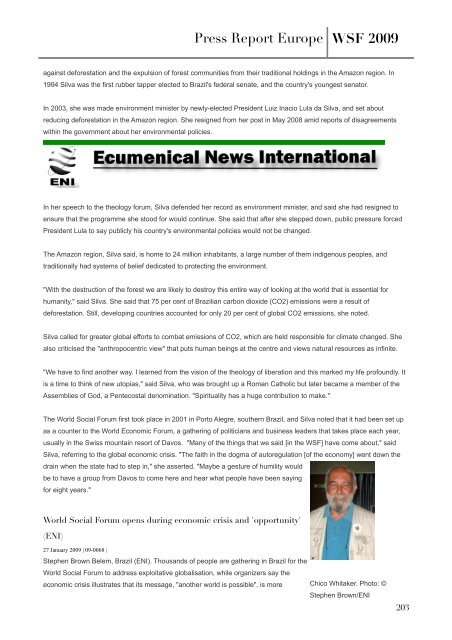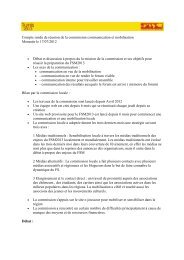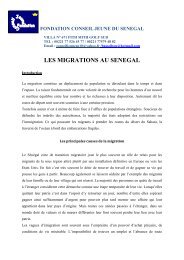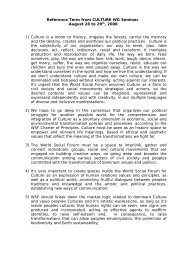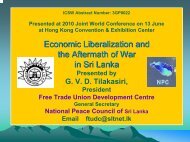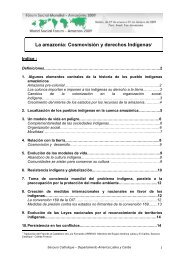You also want an ePaper? Increase the reach of your titles
YUMPU automatically turns print PDFs into web optimized ePapers that Google loves.
<strong>Press</strong> <strong>Report</strong> <strong>Europe</strong> <strong>WSF</strong> <strong>2009</strong><br />
against deforestation and the expulsion of forest communities from their traditional holdings in the Amazon region. In<br />
1994 Silva was the first rubber tapper elected to Brazil's federal senate, and the country's youngest senator.<br />
In 2003, she was made environment minister by newly-elected President Luiz Inacio Lula da Silva, and set about<br />
reducing deforestation in the Amazon region. She resigned from her post in May 2008 amid reports of disagreements<br />
within the government about her environmental policies.<br />
In her speech to the theology forum, Silva defended her record as environment minister, and said she had resigned to<br />
ensure that the programme she stood for would continue. She said that after she stepped down, public pressure forced<br />
President Lula to say publicly his country's environmental policies would not be changed.<br />
The Amazon region, Silva said, is home to 24 million inhabitants, a large number of them indigenous peoples, and<br />
traditionally had systems of belief dedicated to protecting the environment.<br />
"With the destruction of the forest we are likely to destroy this entire way of looking at the world that is essential for<br />
humanity," said Silva. She said that 75 per cent of Brazilian carbon dioxide (CO2) emissions were a result of<br />
deforestation. Still, developing countries accounted for only 20 per cent of global CO2 emissions, she noted.<br />
Silva called for greater global efforts to combat emissions of CO2, which are held responsible for climate changed. She<br />
also criticised the "anthropocentric view" that puts human beings at the centre and views natural resources as infinite.<br />
"We have to find another way. I learned from the vision of the theology of liberation and this marked my life profoundly. It<br />
is a time to think of new utopias," said Silva, who was brought up a Roman Catholic but later became a member of the<br />
Assemblies of God, a Pentecostal denomination. "Spirituality has a huge contribution to make."<br />
The World Social Forum first took place in 2001 in Porto Alegre, southern Brazil, and Silva noted that it had been set up<br />
as a counter to the World Economic Forum, a gathering of politicians and business leaders that takes place each year,<br />
usually in the Swiss mountain resort of Davos. "Many of the things that we said [in the <strong>WSF</strong>] have come about," said<br />
Silva, referring to the global economic crisis. "The faith in the dogma of autoregulation [of the economy] went down the<br />
drain when the state had to step in," she asserted. "Maybe a gesture of humility would<br />
be to have a group from Davos to come here and hear what people have been saying<br />
for eight years."<br />
World Social Forum opens during economic crisis and 'opportunity'<br />
(ENI)<br />
27 January <strong>2009</strong> | 09-0068 |<br />
Stephen Brown Belem, Brazil (ENI). Thousands of people are gathering in Brazil for the<br />
World Social Forum to address exploitative globalisation, while organizers say the<br />
economic crisis illustrates that its message, "another world is possible", is more<br />
Chico Whitaker. Photo: ©<br />
Stephen Brown/ENI<br />
203


